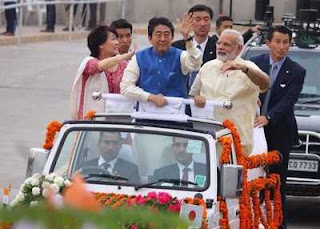Hello friends, on eve of the Republic Day, the Government of India has announced Padma Vibhushan award to Shinzo Abe, former Prime Minister of Japan. Abe has resigned from the office last September because of illness. He has left marks of his own on Indo-Japan ties.
 |
| Shinzo Abe (Source- gettyimages) |
Japan is a natural ally of India if we go by the traditional Kautilya logic of Enemy's enemy is our friend. Considering China as an enemy of both, they are destined together at least in near future. Abe has added his flavor and color to this destiny. How?
Abe became Prime Minister for Japan for the first time in 2006. The very next year, he came to India on a bilateral visit. The visit is now getting famous for Abe's "Confluence of Two Seas" speech in the Indian Parliament. He put forward the vision of Indo Pacific and underlined the role of India Japan relations to maintain a 'Free and Open Indo Pacific'. The Indo pacific is one of the pillars of India- Japan relations today.
He resigned in 2007 because of illness. During the next terms from 2012-2020, Abe visited India thrice. This was the most number of times any Japanese PM has visited India. Abe was a guest of the Republic Day Parade in 2014. It's very interesting to know that the UPA government chose him as a guest in 2014 when elections were so close. When the new government came in power, Japan was the first country visited by the new Prime Minister, Narendra Modi. This signified convergence and consensus in India towards Japan.
 |
| Abe at Republic Day Parade in 2014 (Source- zee news) |
Modi and Abe upgraded India Japan relations to "Special Strategic and Global Partnership." Japan also recognized India as a nuclear power in 2016 as two nations inked a Civil Nuclear pact in 2016. This agreement is one of its kind. India is the only non-signatory country to Non-Proliferation Treaty (NPT) to which Japan has given official recognition as a nuclear power.
Under Abe's leadership, Japan expanded its development assistance to India. Its the only country which allowed to develop infrastructure in India's North East region. Japan's footprint in South East Asia has expanded in the Abe era. India's Act East converge with this as it also seeks to engage more in ASEAN countries.
India and China experienced four publicly known standoffs since 2013. Japan has stood with India in all of them. Shinzo Abe criticized China for violating the status quo in a current standoff as well. Not only this, India- Japan also initiated Asia Africa Growth COrriodor for working jointly in Africa apparently to compete with the Chinese presence in Africa
Abe wrote a book- Towards A Glorious Country- My Vision for Japan. He mentions in it that ,"It may not be surprising if India and Japan relations cross over USA - Japan relations." His fondness towards India and its people have been appreciated in India as well during his visits.
 |
| Abe during Public Rally in India (Source- Times of India) |
There is another message which all politicians take from Abe. He resigned in 2020 because of prolonged chronic illness. In the era when everybody wants to stick to power, Abe simply stepped down being unable to do justice to his office. This offers a lesson to those who cling on chairs for years and years without doing anything significant to the benefit of the public.
Hence, it's truly remarkable( and diplomatic) as well to award him with Padmabhushan (for public affairs)one of the prestigious civilian awards of India. Abe has left a rich legacy to ties between both countries which are experiencing a cherry blossom phase currently. New Japanse PM Yoshihide Suga has a huge task to take this forward.
References-


Nice and very informative blog!Keep writing dada👌👍
ReplyDeleteThank you so much 😊
ReplyDelete👌👌
ReplyDeleteThanks😊
ReplyDelete